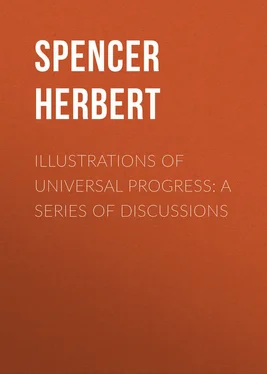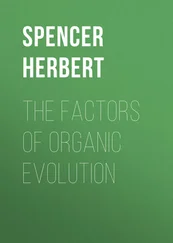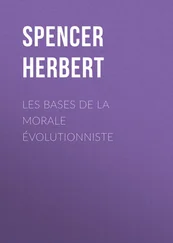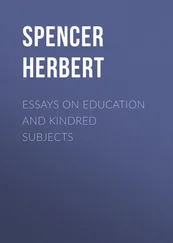Herbert Spencer - Illustrations of Universal Progress - A Series of Discussions
Здесь есть возможность читать онлайн «Herbert Spencer - Illustrations of Universal Progress - A Series of Discussions» — ознакомительный отрывок электронной книги совершенно бесплатно, а после прочтения отрывка купить полную версию. В некоторых случаях можно слушать аудио, скачать через торрент в формате fb2 и присутствует краткое содержание. Жанр: Философия, foreign_antique, foreign_prose, на английском языке. Описание произведения, (предисловие) а так же отзывы посетителей доступны на портале библиотеки ЛибКат.
- Название:Illustrations of Universal Progress: A Series of Discussions
- Автор:
- Жанр:
- Год:неизвестен
- ISBN:нет данных
- Рейтинг книги:4 / 5. Голосов: 1
-
Избранное:Добавить в избранное
- Отзывы:
-
Ваша оценка:
- 80
- 1
- 2
- 3
- 4
- 5
Illustrations of Universal Progress: A Series of Discussions: краткое содержание, описание и аннотация
Предлагаем к чтению аннотацию, описание, краткое содержание или предисловие (зависит от того, что написал сам автор книги «Illustrations of Universal Progress: A Series of Discussions»). Если вы не нашли необходимую информацию о книге — напишите в комментариях, мы постараемся отыскать её.
Illustrations of Universal Progress: A Series of Discussions — читать онлайн ознакомительный отрывок
Ниже представлен текст книги, разбитый по страницам. Система сохранения места последней прочитанной страницы, позволяет с удобством читать онлайн бесплатно книгу «Illustrations of Universal Progress: A Series of Discussions», без необходимости каждый раз заново искать на чём Вы остановились. Поставьте закладку, и сможете в любой момент перейти на страницу, на которой закончили чтение.
Интервал:
Закладка:
Though we find here some unwarranted assumptions, as well as some grave omissions, yet this part (Laws of the Knowable) may be considered, upon the whole, as a fine specimen of scientific reasoning. Considerable space is devoted to the "Law of Evolution" the discovery of which is the author's chief claim to originality, and certainly evinces great power of generalization. To quote the abstract definition without a full statement of the inductions from which it is derived would convey no fair impression of the breadth and strength of the thought which it epitomizes. Of Mr. Spencer's general characteristics as a writer, we may observe that his style is marked by great purity, clearness, and force; though it is somewhat diffuse, and the abstract nature of some of his topics occasionally renders his thought difficult of apprehension. His treatment of his subjects is generally thorough and sometimes exhaustive; his arguments are always ingenious if not always convincing; his illustrations are drawn from almost every accessible field of human knowledge, and his method of "putting things" is such as to make the most of his materials. He is undoubtedly entitled to a high rank among the speculative and philosophic writers of the present day…
In Mr. Spencer we have the example of a positivist, who does not treat the subject of religion with supercilious neglect, and who illustrates by his own method of reasoning upon the highest objects of human thought, the value of those metaphysical studies which it is so much the fashion of his school to decry. For both these reasons the volume, which we now propose to examine, deserves the careful attention of the theologian who desires to know what one of the strongest thinkers of his school, commonly thought atheistic in its tendencies, can say in behalf of our ultimate religious ideas. For if we mistake not, in spite of the very negative character of his own results, he has furnished some strong arguments for the doctrine of a positive Christian theology. We shall be mistaken if we expect to find him carelessly passing these matters by (religious faith and theological science) as in all respects beyond knowledge and of no practical concern. On the contrary, he gives them profound attention, and arrives at conclusions in regard to them which even the Christian theologian must allow to contain a large measure of truth. While showing the unsearchable nature of the ultimate facts on which religion depends, he demonstrates their real existence and their great importance… In answering these questions Mr. Spencer has, we think, arrived nearer to a true philosophy than either Hamilton or Mansel. At least he has indicated in a more satisfactory manner than they have done, the positive datum of consciousness that the unconditioned, though inscrutable, exists . It may be said that Mr. Spencer is not chargeable with excluding God from the universe, or denying all revelation of Him in His works, since he earnestly defends the truth that an inscrutable power is shown to exist . We certainly would not charge him with theoretical atheism, holding as he does this ultimate religious idea.
The law of organic development announced in the early part of the present century, by Goethe, Schelling, and Von Baer, and vaguely expressed in the formula, that "evolution is always from the homogenous to the heterogeneous, and from the simple to the complex," has recently been extended by Herbert Spencer so as to include all phenomena whatsoever. He has shown that this law of evolution is the law of all evolution. Whether it be in the development of the earth or of life upon its surface, in the development of Society, of government, of manufactures, of commerce, of language, literature, science and art, this same advance from the simple to the complex, through successive differentiations, holds uniformly. The stupendous induction from all classes of phenomena by which Mr. Spencer proceeds to establish and illustrate his theorem cannot be given here.
Mr. Spencer claims for his view that it is not only a religious position, but preëminently the religious position; and we are most thoroughly disposed to agree with him, though we think he does not appreciate the force of his own argument, nor fully understand his own words. For let us now attempt to realize the meaning of this fact, of which Mr. Spencer and his compeers have put us in possession; let us endeavour to see whether its bearings are really favorable or adverse to religion. They are put forward indeed avowedly as adverse to any other religion than a mere reverential acquiescence in ignorance concerning all that truly exists; but it appears to us that this supposed opposition to religion arises from the fact that the doctrine itself is so profoundly, so intensely, so overwhelmingly religious, nay, so utterly and entirely Christian, that its true meaning could not be seen for very glory. Like Moses, when he came down from the Mount, this positive philosophy comes with a veil over its face, that its too divine radiance may be hidden for a time. This is Science that has been conversing with God, and brings in her hand His law written on tables of stone.
To answer the question of the likelihood of the permanence of Mr. Mill's philosophic reign, … we should have to take account, among other things, of the differences from Mr. Mill already shown by the extraordinarily able and peculiarly original thinker whose name we have associated with Mr. Mill's at the head of this article. We may take occasion, at another time, to call attention to these speculations of Mr. Herbert Spencer, whose works in the meantime, and especially that new one whose title we have cited, we recommend to all those select readers whose appreciation of masterly exposition, and great reach and boldness of generalization, does not depend on their mere disposition to agree with the doctrines propounded.
Complete in itself, it is at the same time but a part of a whole, which, if it should be constructed in proportion, will be ten times as great. For these First Principles are merely the foundation of a system of philosophy, bolder, more elaborate and comprehensive, perhaps, than any other which has been hitherto designed in England… Widely as it will be seen we differ from the author on some points, we very sincerely hope he may succeed in accomplishing the bold and magnificent project he has mapped out.
Our "Survey," superficial as it is, must include at least the mention of a work so lofty in aim, and so remarkable in execution as the system of Philosophy which Mr. Herbert Spencer is issuing to subscribers… In spite of all dissidence respecting the conclusions, the serious reader will applaud the profound earnestness and thoroughness with which these conclusions are advocated; the universal scientific knowledge brought to bear on them by way of illustration, and the acute and subtle thinking displayed in every chapter.
By these books he has wedged his way into fame in a manner distinctly original, and curiously marked… There is a peculiar charm in this author's style, in that it sacrifices to no common taste, while at the same time it makes the most abstruse questions intelligible… The book, if it is to be noticed with the slightest degree of fairness, requires to be read and re-read, to be studied apart from itself and with itself. For whatever may be its ultimate fate – although as the ages go on it shall become but as the lispings of a little child, a little more educated than other lisping children of the same time – this is certain, that, as a book addressed to the present, it lifts the mind far above the ordinary range of thought, suggests new associations, arranges chaotic pictures, strikes often a broad harmony, and even moves the heart by an intellectual struggle as passionless as fate, but as irresistible as time.
Читать дальшеИнтервал:
Закладка:
Похожие книги на «Illustrations of Universal Progress: A Series of Discussions»
Представляем Вашему вниманию похожие книги на «Illustrations of Universal Progress: A Series of Discussions» списком для выбора. Мы отобрали схожую по названию и смыслу литературу в надежде предоставить читателям больше вариантов отыскать новые, интересные, ещё непрочитанные произведения.
Обсуждение, отзывы о книге «Illustrations of Universal Progress: A Series of Discussions» и просто собственные мнения читателей. Оставьте ваши комментарии, напишите, что Вы думаете о произведении, его смысле или главных героях. Укажите что конкретно понравилось, а что нет, и почему Вы так считаете.












